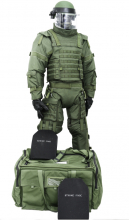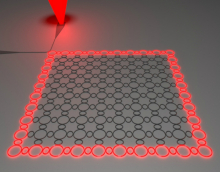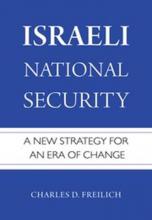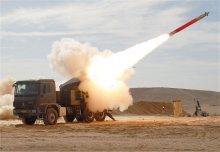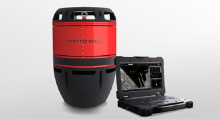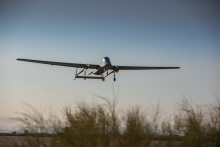Massive Israeli Presence at Singapore Airshow 2018
| 05/02/2018
Singapore Airshow, Asia's largest aerospace and defense event, will be held on February 6-11 at the Changi Exhibition Centre. More than 1,000 companies from 50 countries – including 65 of the top 100 global aerospace companies – have confirmed their participation in the biennial event.
Companies from major aviation markets such as the US, Germany, France, the UK, and Israel are expected to maintain significant representation.
Here are some of the Israeli-made solutions and technologies to be exhibited at the airshow:
Israel, Poland to Cooperate on Energy Infrastructure Cybersecurity
| 05/02/2018
Polish power grid operator PSE (Polskie Sieci Elektroenergetyczne) will cooperate with Israel Electric Corporation to fight potential cyber threats in the energy sector.
PSE started a computer emergency response team (CERT) at the end of 2016 to help maintain cybersecurity. The special unit has already started cooperation with its counterparts in the United States and Norway. The Polish power grid operator said the Israeli utility was a leader in its region in the cybersecurity field.
Lior Textile will Supply Sapper Suits to Western European Country
| 05/02/2018
Lior Textile Industries, an Israeli manufacturer and supplier of personal protective products, announced that it had won a €1.5 million contract to supply hundreds of sapper suits to a Western European country's military.
Technion Scientists Developed New Semiconductor Laser System
| 05/02/2018
Israeli and American researchers have developed a new highly efficient coherent and robust semiconductor laser system: the topological insulator laser.
Turkish Air Force Receives First Two ANKA-S UAVs
| 05/02/2018
Turkish Aerospace Industries (TAI) has delivered two ANKA-S UAVs and related systems to the Turkish Air Forces, the Daily Sabah reports.
The ANKA-S is equipped with SATCOM and IFF (Identification Friend and Foe) systems and can carry locally-produced munitions. The UAV will be able to control six air vehicles simultaneously via satellite.
Israeli National Security: A New Strategy for an Era of Change
| 05/02/2018
National security has been at the forefront of the Israeli experience for seven decades, with threats ranging from terrorism, to vast rocket and missile arsenals, and even existential nuclear dangers. Yet, despite its overwhelming preoccupation with foreign and defense affairs, Israel does not have a formal national security strategy.
Report: IDF to Establish New Ground-to-Ground Missile Force
| 04/02/2018
Israeli Defense Minister Avigdor Lieberman has ordered the IDF to create a vast network of medium-range surface-to-surface missile systems, the Yedioth Ahronoth daily reported on Friday.
According to the Yedioth article, on January 4 Lieberman met with senior IDF officers and decided to form the array, pledging a starting budget of some 500 million ILS (about $145 million). The project could cost up to 7 billion ILS ($2 billion), spread out over a decade, depending on the number of missiles the IDF will acquire.
DSIT to Supply Portable Diver Detection Sonars to Indian Navy
| 04/02/2018
Israel-based DSIT Solutions and Tata Power SED are set to deliver 78 units of the PointShield portable diver detection sonar (PDDS) to the Indian Navy.
The procurement initiative will see some of the sonars supplied directly by DSIT, while the remaining units will be developed by Tata Power SED in India under DSIT’s supervision and support.
Egypt's War against the Gaza Tunnels
| 04/02/2018
The Egyptian army announced on February 2, 2018, the destruction of a tunnel under the Gaza border. A spokesman said that explosive devices in three warehouses, as well as a tunnel used by "terrorists," were destroyed.
Over the course of 2017, the Egyptian army has destroyed 63 cross-border tunnels linking the Gaza Strip to Egypt’s Sinai Peninsula, the service added.
IAI Launches New Capability for Heron UAV: Take-off and Landing with Remote Satellite Communication
| 04/02/2018
Israel Aerospace Industries (IAI) will present a new operational and technological capability to the Heron RPA Family at the Singapore Air Show next week. With the new capability, the Heron can automatically land in remote runways located thousands of kilometers away, where it is serviced by a small team and basic fueling infrastructure before it takes off for another mission.
Singapore Airshow, Asia's largest aerospace and defense event, will be held on February 6-11 at the Changi Exhibition Centre. More than 1,000 companies from 50 countries – including 65 of the top 100 global aerospace companies – have confirmed their participation in the biennial event.
Companies from major aviation markets such as the US, Germany, France, the UK, and Israel are expected to maintain significant representation.
Here are some of the Israeli-made solutions and technologies to be exhibited at the airshow:
Israel, Poland to Cooperate on Energy Infrastructure Cybersecurity
| 05/02/2018
Polish power grid operator PSE (Polskie Sieci Elektroenergetyczne) will cooperate with Israel Electric Corporation to fight potential cyber threats in the energy sector.
PSE started a computer emergency response team (CERT) at the end of 2016 to help maintain cybersecurity. The special unit has already started cooperation with its counterparts in the United States and Norway. The Polish power grid operator said the Israeli utility was a leader in its region in the cybersecurity field.
Lior Textile will Supply Sapper Suits to Western European Country
| 05/02/2018
Lior Textile Industries, an Israeli manufacturer and supplier of personal protective products, announced that it had won a €1.5 million contract to supply hundreds of sapper suits to a Western European country's military.
Technion Scientists Developed New Semiconductor Laser System
| 05/02/2018
Israeli and American researchers have developed a new highly efficient coherent and robust semiconductor laser system: the topological insulator laser.
Turkish Air Force Receives First Two ANKA-S UAVs
| 05/02/2018
Turkish Aerospace Industries (TAI) has delivered two ANKA-S UAVs and related systems to the Turkish Air Forces, the Daily Sabah reports.
The ANKA-S is equipped with SATCOM and IFF (Identification Friend and Foe) systems and can carry locally-produced munitions. The UAV will be able to control six air vehicles simultaneously via satellite.
Israeli National Security: A New Strategy for an Era of Change
| 05/02/2018
National security has been at the forefront of the Israeli experience for seven decades, with threats ranging from terrorism, to vast rocket and missile arsenals, and even existential nuclear dangers. Yet, despite its overwhelming preoccupation with foreign and defense affairs, Israel does not have a formal national security strategy.
Report: IDF to Establish New Ground-to-Ground Missile Force
| 04/02/2018
Israeli Defense Minister Avigdor Lieberman has ordered the IDF to create a vast network of medium-range surface-to-surface missile systems, the Yedioth Ahronoth daily reported on Friday.
According to the Yedioth article, on January 4 Lieberman met with senior IDF officers and decided to form the array, pledging a starting budget of some 500 million ILS (about $145 million). The project could cost up to 7 billion ILS ($2 billion), spread out over a decade, depending on the number of missiles the IDF will acquire.
DSIT to Supply Portable Diver Detection Sonars to Indian Navy
| 04/02/2018
Israel-based DSIT Solutions and Tata Power SED are set to deliver 78 units of the PointShield portable diver detection sonar (PDDS) to the Indian Navy.
The procurement initiative will see some of the sonars supplied directly by DSIT, while the remaining units will be developed by Tata Power SED in India under DSIT’s supervision and support.
Egypt's War against the Gaza Tunnels
| 04/02/2018
The Egyptian army announced on February 2, 2018, the destruction of a tunnel under the Gaza border. A spokesman said that explosive devices in three warehouses, as well as a tunnel used by "terrorists," were destroyed.
Over the course of 2017, the Egyptian army has destroyed 63 cross-border tunnels linking the Gaza Strip to Egypt’s Sinai Peninsula, the service added.
IAI Launches New Capability for Heron UAV: Take-off and Landing with Remote Satellite Communication
| 04/02/2018
Israel Aerospace Industries (IAI) will present a new operational and technological capability to the Heron RPA Family at the Singapore Air Show next week. With the new capability, the Heron can automatically land in remote runways located thousands of kilometers away, where it is serviced by a small team and basic fueling infrastructure before it takes off for another mission.
Polish power grid operator PSE (Polskie Sieci Elektroenergetyczne) will cooperate with Israel Electric Corporation to fight potential cyber threats in the energy sector.
PSE started a computer emergency response team (CERT) at the end of 2016 to help maintain cybersecurity. The special unit has already started cooperation with its counterparts in the United States and Norway. The Polish power grid operator said the Israeli utility was a leader in its region in the cybersecurity field.
Lior Textile will Supply Sapper Suits to Western European Country
| 05/02/2018
Lior Textile Industries, an Israeli manufacturer and supplier of personal protective products, announced that it had won a €1.5 million contract to supply hundreds of sapper suits to a Western European country's military.
Technion Scientists Developed New Semiconductor Laser System
| 05/02/2018
Israeli and American researchers have developed a new highly efficient coherent and robust semiconductor laser system: the topological insulator laser.
Turkish Air Force Receives First Two ANKA-S UAVs
| 05/02/2018
Turkish Aerospace Industries (TAI) has delivered two ANKA-S UAVs and related systems to the Turkish Air Forces, the Daily Sabah reports.
The ANKA-S is equipped with SATCOM and IFF (Identification Friend and Foe) systems and can carry locally-produced munitions. The UAV will be able to control six air vehicles simultaneously via satellite.
Israeli National Security: A New Strategy for an Era of Change
| 05/02/2018
National security has been at the forefront of the Israeli experience for seven decades, with threats ranging from terrorism, to vast rocket and missile arsenals, and even existential nuclear dangers. Yet, despite its overwhelming preoccupation with foreign and defense affairs, Israel does not have a formal national security strategy.
Report: IDF to Establish New Ground-to-Ground Missile Force
| 04/02/2018
Israeli Defense Minister Avigdor Lieberman has ordered the IDF to create a vast network of medium-range surface-to-surface missile systems, the Yedioth Ahronoth daily reported on Friday.
According to the Yedioth article, on January 4 Lieberman met with senior IDF officers and decided to form the array, pledging a starting budget of some 500 million ILS (about $145 million). The project could cost up to 7 billion ILS ($2 billion), spread out over a decade, depending on the number of missiles the IDF will acquire.
DSIT to Supply Portable Diver Detection Sonars to Indian Navy
| 04/02/2018
Israel-based DSIT Solutions and Tata Power SED are set to deliver 78 units of the PointShield portable diver detection sonar (PDDS) to the Indian Navy.
The procurement initiative will see some of the sonars supplied directly by DSIT, while the remaining units will be developed by Tata Power SED in India under DSIT’s supervision and support.
Egypt's War against the Gaza Tunnels
| 04/02/2018
The Egyptian army announced on February 2, 2018, the destruction of a tunnel under the Gaza border. A spokesman said that explosive devices in three warehouses, as well as a tunnel used by "terrorists," were destroyed.
Over the course of 2017, the Egyptian army has destroyed 63 cross-border tunnels linking the Gaza Strip to Egypt’s Sinai Peninsula, the service added.
IAI Launches New Capability for Heron UAV: Take-off and Landing with Remote Satellite Communication
| 04/02/2018
Israel Aerospace Industries (IAI) will present a new operational and technological capability to the Heron RPA Family at the Singapore Air Show next week. With the new capability, the Heron can automatically land in remote runways located thousands of kilometers away, where it is serviced by a small team and basic fueling infrastructure before it takes off for another mission.
Lior Textile Industries, an Israeli manufacturer and supplier of personal protective products, announced that it had won a €1.5 million contract to supply hundreds of sapper suits to a Western European country's military.
Technion Scientists Developed New Semiconductor Laser System
| 05/02/2018
Israeli and American researchers have developed a new highly efficient coherent and robust semiconductor laser system: the topological insulator laser.
Turkish Air Force Receives First Two ANKA-S UAVs
| 05/02/2018
Turkish Aerospace Industries (TAI) has delivered two ANKA-S UAVs and related systems to the Turkish Air Forces, the Daily Sabah reports.
The ANKA-S is equipped with SATCOM and IFF (Identification Friend and Foe) systems and can carry locally-produced munitions. The UAV will be able to control six air vehicles simultaneously via satellite.
Israeli National Security: A New Strategy for an Era of Change
| 05/02/2018
National security has been at the forefront of the Israeli experience for seven decades, with threats ranging from terrorism, to vast rocket and missile arsenals, and even existential nuclear dangers. Yet, despite its overwhelming preoccupation with foreign and defense affairs, Israel does not have a formal national security strategy.
Report: IDF to Establish New Ground-to-Ground Missile Force
| 04/02/2018
Israeli Defense Minister Avigdor Lieberman has ordered the IDF to create a vast network of medium-range surface-to-surface missile systems, the Yedioth Ahronoth daily reported on Friday.
According to the Yedioth article, on January 4 Lieberman met with senior IDF officers and decided to form the array, pledging a starting budget of some 500 million ILS (about $145 million). The project could cost up to 7 billion ILS ($2 billion), spread out over a decade, depending on the number of missiles the IDF will acquire.
DSIT to Supply Portable Diver Detection Sonars to Indian Navy
| 04/02/2018
Israel-based DSIT Solutions and Tata Power SED are set to deliver 78 units of the PointShield portable diver detection sonar (PDDS) to the Indian Navy.
The procurement initiative will see some of the sonars supplied directly by DSIT, while the remaining units will be developed by Tata Power SED in India under DSIT’s supervision and support.
Egypt's War against the Gaza Tunnels
| 04/02/2018
The Egyptian army announced on February 2, 2018, the destruction of a tunnel under the Gaza border. A spokesman said that explosive devices in three warehouses, as well as a tunnel used by "terrorists," were destroyed.
Over the course of 2017, the Egyptian army has destroyed 63 cross-border tunnels linking the Gaza Strip to Egypt’s Sinai Peninsula, the service added.
IAI Launches New Capability for Heron UAV: Take-off and Landing with Remote Satellite Communication
| 04/02/2018
Israel Aerospace Industries (IAI) will present a new operational and technological capability to the Heron RPA Family at the Singapore Air Show next week. With the new capability, the Heron can automatically land in remote runways located thousands of kilometers away, where it is serviced by a small team and basic fueling infrastructure before it takes off for another mission.
Israeli and American researchers have developed a new highly efficient coherent and robust semiconductor laser system: the topological insulator laser.
Turkish Air Force Receives First Two ANKA-S UAVs
| 05/02/2018
Turkish Aerospace Industries (TAI) has delivered two ANKA-S UAVs and related systems to the Turkish Air Forces, the Daily Sabah reports.
The ANKA-S is equipped with SATCOM and IFF (Identification Friend and Foe) systems and can carry locally-produced munitions. The UAV will be able to control six air vehicles simultaneously via satellite.
Israeli National Security: A New Strategy for an Era of Change
| 05/02/2018
National security has been at the forefront of the Israeli experience for seven decades, with threats ranging from terrorism, to vast rocket and missile arsenals, and even existential nuclear dangers. Yet, despite its overwhelming preoccupation with foreign and defense affairs, Israel does not have a formal national security strategy.
Report: IDF to Establish New Ground-to-Ground Missile Force
| 04/02/2018
Israeli Defense Minister Avigdor Lieberman has ordered the IDF to create a vast network of medium-range surface-to-surface missile systems, the Yedioth Ahronoth daily reported on Friday.
According to the Yedioth article, on January 4 Lieberman met with senior IDF officers and decided to form the array, pledging a starting budget of some 500 million ILS (about $145 million). The project could cost up to 7 billion ILS ($2 billion), spread out over a decade, depending on the number of missiles the IDF will acquire.
DSIT to Supply Portable Diver Detection Sonars to Indian Navy
| 04/02/2018
Israel-based DSIT Solutions and Tata Power SED are set to deliver 78 units of the PointShield portable diver detection sonar (PDDS) to the Indian Navy.
The procurement initiative will see some of the sonars supplied directly by DSIT, while the remaining units will be developed by Tata Power SED in India under DSIT’s supervision and support.
Egypt's War against the Gaza Tunnels
| 04/02/2018
The Egyptian army announced on February 2, 2018, the destruction of a tunnel under the Gaza border. A spokesman said that explosive devices in three warehouses, as well as a tunnel used by "terrorists," were destroyed.
Over the course of 2017, the Egyptian army has destroyed 63 cross-border tunnels linking the Gaza Strip to Egypt’s Sinai Peninsula, the service added.
IAI Launches New Capability for Heron UAV: Take-off and Landing with Remote Satellite Communication
| 04/02/2018
Israel Aerospace Industries (IAI) will present a new operational and technological capability to the Heron RPA Family at the Singapore Air Show next week. With the new capability, the Heron can automatically land in remote runways located thousands of kilometers away, where it is serviced by a small team and basic fueling infrastructure before it takes off for another mission.
Turkish Aerospace Industries (TAI) has delivered two ANKA-S UAVs and related systems to the Turkish Air Forces, the Daily Sabah reports.
The ANKA-S is equipped with SATCOM and IFF (Identification Friend and Foe) systems and can carry locally-produced munitions. The UAV will be able to control six air vehicles simultaneously via satellite.
Israeli National Security: A New Strategy for an Era of Change
| 05/02/2018
National security has been at the forefront of the Israeli experience for seven decades, with threats ranging from terrorism, to vast rocket and missile arsenals, and even existential nuclear dangers. Yet, despite its overwhelming preoccupation with foreign and defense affairs, Israel does not have a formal national security strategy.
Report: IDF to Establish New Ground-to-Ground Missile Force
| 04/02/2018
Israeli Defense Minister Avigdor Lieberman has ordered the IDF to create a vast network of medium-range surface-to-surface missile systems, the Yedioth Ahronoth daily reported on Friday.
According to the Yedioth article, on January 4 Lieberman met with senior IDF officers and decided to form the array, pledging a starting budget of some 500 million ILS (about $145 million). The project could cost up to 7 billion ILS ($2 billion), spread out over a decade, depending on the number of missiles the IDF will acquire.
DSIT to Supply Portable Diver Detection Sonars to Indian Navy
| 04/02/2018
Israel-based DSIT Solutions and Tata Power SED are set to deliver 78 units of the PointShield portable diver detection sonar (PDDS) to the Indian Navy.
The procurement initiative will see some of the sonars supplied directly by DSIT, while the remaining units will be developed by Tata Power SED in India under DSIT’s supervision and support.
Egypt's War against the Gaza Tunnels
| 04/02/2018
The Egyptian army announced on February 2, 2018, the destruction of a tunnel under the Gaza border. A spokesman said that explosive devices in three warehouses, as well as a tunnel used by "terrorists," were destroyed.
Over the course of 2017, the Egyptian army has destroyed 63 cross-border tunnels linking the Gaza Strip to Egypt’s Sinai Peninsula, the service added.
IAI Launches New Capability for Heron UAV: Take-off and Landing with Remote Satellite Communication
| 04/02/2018
Israel Aerospace Industries (IAI) will present a new operational and technological capability to the Heron RPA Family at the Singapore Air Show next week. With the new capability, the Heron can automatically land in remote runways located thousands of kilometers away, where it is serviced by a small team and basic fueling infrastructure before it takes off for another mission.
National security has been at the forefront of the Israeli experience for seven decades, with threats ranging from terrorism, to vast rocket and missile arsenals, and even existential nuclear dangers. Yet, despite its overwhelming preoccupation with foreign and defense affairs, Israel does not have a formal national security strategy.
Report: IDF to Establish New Ground-to-Ground Missile Force
| 04/02/2018
Israeli Defense Minister Avigdor Lieberman has ordered the IDF to create a vast network of medium-range surface-to-surface missile systems, the Yedioth Ahronoth daily reported on Friday.
According to the Yedioth article, on January 4 Lieberman met with senior IDF officers and decided to form the array, pledging a starting budget of some 500 million ILS (about $145 million). The project could cost up to 7 billion ILS ($2 billion), spread out over a decade, depending on the number of missiles the IDF will acquire.
DSIT to Supply Portable Diver Detection Sonars to Indian Navy
| 04/02/2018
Israel-based DSIT Solutions and Tata Power SED are set to deliver 78 units of the PointShield portable diver detection sonar (PDDS) to the Indian Navy.
The procurement initiative will see some of the sonars supplied directly by DSIT, while the remaining units will be developed by Tata Power SED in India under DSIT’s supervision and support.
Egypt's War against the Gaza Tunnels
| 04/02/2018
The Egyptian army announced on February 2, 2018, the destruction of a tunnel under the Gaza border. A spokesman said that explosive devices in three warehouses, as well as a tunnel used by "terrorists," were destroyed.
Over the course of 2017, the Egyptian army has destroyed 63 cross-border tunnels linking the Gaza Strip to Egypt’s Sinai Peninsula, the service added.
IAI Launches New Capability for Heron UAV: Take-off and Landing with Remote Satellite Communication
| 04/02/2018
Israel Aerospace Industries (IAI) will present a new operational and technological capability to the Heron RPA Family at the Singapore Air Show next week. With the new capability, the Heron can automatically land in remote runways located thousands of kilometers away, where it is serviced by a small team and basic fueling infrastructure before it takes off for another mission.
Israeli Defense Minister Avigdor Lieberman has ordered the IDF to create a vast network of medium-range surface-to-surface missile systems, the Yedioth Ahronoth daily reported on Friday.
According to the Yedioth article, on January 4 Lieberman met with senior IDF officers and decided to form the array, pledging a starting budget of some 500 million ILS (about $145 million). The project could cost up to 7 billion ILS ($2 billion), spread out over a decade, depending on the number of missiles the IDF will acquire.
DSIT to Supply Portable Diver Detection Sonars to Indian Navy
| 04/02/2018
Israel-based DSIT Solutions and Tata Power SED are set to deliver 78 units of the PointShield portable diver detection sonar (PDDS) to the Indian Navy.
The procurement initiative will see some of the sonars supplied directly by DSIT, while the remaining units will be developed by Tata Power SED in India under DSIT’s supervision and support.
Egypt's War against the Gaza Tunnels
| 04/02/2018
The Egyptian army announced on February 2, 2018, the destruction of a tunnel under the Gaza border. A spokesman said that explosive devices in three warehouses, as well as a tunnel used by "terrorists," were destroyed.
Over the course of 2017, the Egyptian army has destroyed 63 cross-border tunnels linking the Gaza Strip to Egypt’s Sinai Peninsula, the service added.
IAI Launches New Capability for Heron UAV: Take-off and Landing with Remote Satellite Communication
| 04/02/2018
Israel Aerospace Industries (IAI) will present a new operational and technological capability to the Heron RPA Family at the Singapore Air Show next week. With the new capability, the Heron can automatically land in remote runways located thousands of kilometers away, where it is serviced by a small team and basic fueling infrastructure before it takes off for another mission.
Israel-based DSIT Solutions and Tata Power SED are set to deliver 78 units of the PointShield portable diver detection sonar (PDDS) to the Indian Navy.
The procurement initiative will see some of the sonars supplied directly by DSIT, while the remaining units will be developed by Tata Power SED in India under DSIT’s supervision and support.
Egypt's War against the Gaza Tunnels
| 04/02/2018
The Egyptian army announced on February 2, 2018, the destruction of a tunnel under the Gaza border. A spokesman said that explosive devices in three warehouses, as well as a tunnel used by "terrorists," were destroyed.
Over the course of 2017, the Egyptian army has destroyed 63 cross-border tunnels linking the Gaza Strip to Egypt’s Sinai Peninsula, the service added.
IAI Launches New Capability for Heron UAV: Take-off and Landing with Remote Satellite Communication
| 04/02/2018
Israel Aerospace Industries (IAI) will present a new operational and technological capability to the Heron RPA Family at the Singapore Air Show next week. With the new capability, the Heron can automatically land in remote runways located thousands of kilometers away, where it is serviced by a small team and basic fueling infrastructure before it takes off for another mission.
The Egyptian army announced on February 2, 2018, the destruction of a tunnel under the Gaza border. A spokesman said that explosive devices in three warehouses, as well as a tunnel used by "terrorists," were destroyed.
Over the course of 2017, the Egyptian army has destroyed 63 cross-border tunnels linking the Gaza Strip to Egypt’s Sinai Peninsula, the service added.
IAI Launches New Capability for Heron UAV: Take-off and Landing with Remote Satellite Communication
| 04/02/2018
Israel Aerospace Industries (IAI) will present a new operational and technological capability to the Heron RPA Family at the Singapore Air Show next week. With the new capability, the Heron can automatically land in remote runways located thousands of kilometers away, where it is serviced by a small team and basic fueling infrastructure before it takes off for another mission.
Israel Aerospace Industries (IAI) will present a new operational and technological capability to the Heron RPA Family at the Singapore Air Show next week. With the new capability, the Heron can automatically land in remote runways located thousands of kilometers away, where it is serviced by a small team and basic fueling infrastructure before it takes off for another mission.



